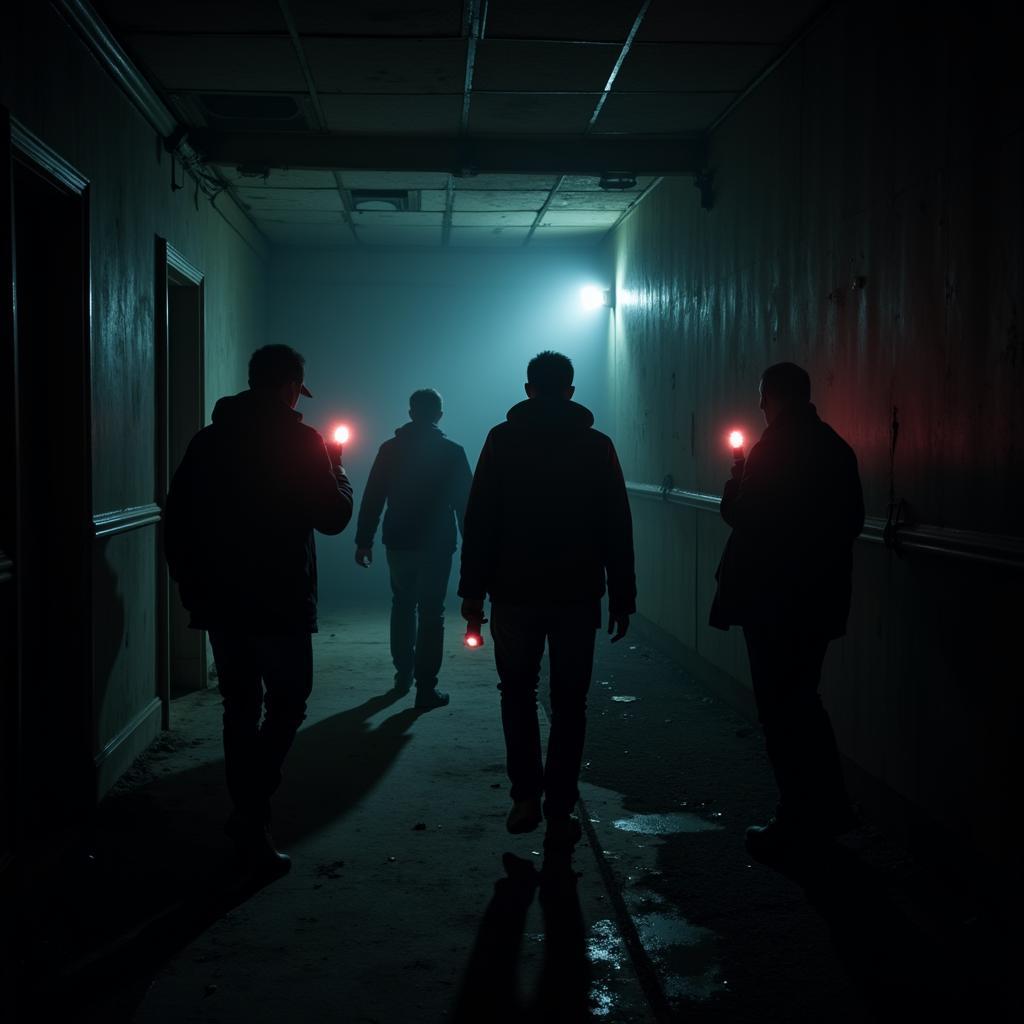The world of the paranormal, shrouded in mystery and intrigue, has always captivated the human imagination. For those with an insatiable thirst for knowledge and a passion for exploring the unknown, a career as a Graduate Researcher in this field presents a uniquely challenging and rewarding path.
 Graduate Researcher Analyzing Paranormal Evidence
Graduate Researcher Analyzing Paranormal Evidence
Delving Deeper: The Allure of Paranormal Research
Graduate research opportunities within the realm of the paranormal are as diverse as the phenomena themselves. From investigating haunted locations to studying extrasensory perception (ESP) and psychokinesis, the possibilities are vast. However, the path to becoming a successful researcher in this unconventional field requires a unique blend of skepticism and open-mindedness, analytical thinking, and a strong academic foundation.
Navigating Academia: Finding Your Niche
While traditional academic institutions might not offer specific “Paranormal Studies” degrees, there are numerous related fields that can serve as stepping stones for aspiring researchers. Consider pursuing a graduate degree in:
- Psychology: Focus on areas like parapsychology, consciousness studies, or anomalous experiences.
- Religious Studies: Explore the history, folklore, and cultural significance of paranormal beliefs and practices.
- Folklore: Delve into the study of myths, legends, and supernatural narratives across different cultures.
- History: Investigate the historical context of paranormal claims and the evolution of belief systems.
- Anthropology: Study how different cultures perceive and interact with the paranormal.
Essential Skills for Aspiring Researchers
- Critical Thinking: The ability to analyze information objectively, identify biases, and separate fact from fiction is paramount.
- Research Methodology: A strong understanding of research design, data collection, and statistical analysis is crucial for conducting rigorous investigations.
- Communication Skills: Effectively communicating research findings through written reports, presentations, and publications is essential.
- Open-mindedness: A willingness to consider alternative explanations and challenge personal beliefs is key to approaching the paranormal with a scientific lens.
- Ethical Conduct: Maintaining high ethical standards, respecting privacy, and obtaining informed consent from subjects involved in research is of utmost importance.
 Paranormal Research Team Conducting an Investigation
Paranormal Research Team Conducting an Investigation
Pursuing Funding and Research Opportunities
Securing funding for paranormal research can be challenging. However, there are grants and fellowships available through private organizations and foundations dedicated to supporting research in this area. Networking with established researchers and attending conferences like the Society for Psychical Research (SPR) or the Parapsychological Association (PA) can provide valuable insights and potential collaboration opportunities.
The Importance of Research Experience
Gaining hands-on research experience is essential for aspiring graduate researchers. Consider volunteering with local paranormal investigation groups or assisting established researchers in your field of interest. These experiences can provide practical knowledge, enhance your research skills, and strengthen your graduate school applications. Many universities also offer research experience for undergraduates chemistry and other STEM fields, which can provide valuable transferable skills.
For those aiming for top-tier programs, securing a ucsd undergraduate award for excellence in research or similar recognition can demonstrate your research capabilities and commitment to the field.
Graduate Research Fellowship Program: A Gateway to Success
Applying for a graduate research fellowship program can provide financial support, mentorship, and networking opportunities to further your research goals. These programs are highly competitive but offer invaluable resources and recognition for aspiring academics.
Grants for Undergraduate Research: Funding Your Passion
Explore grants for undergraduate research to fund your own independent investigations or assist with faculty-led research projects. These grants can provide valuable funding and enhance your application to graduate programs.
The Future of Paranormal Research: A Call for Rigor and Collaboration
As our understanding of the human mind, consciousness, and the universe continues to evolve, so too will the field of paranormal research. The future holds exciting possibilities for those who dare to explore the unknown with a critical yet open mind. By embracing rigorous scientific methods, collaborating across disciplines, and fostering open dialogue, graduate researchers can play a pivotal role in shedding light on some of the most perplexing mysteries that have captivated humanity for centuries.
FAQs about Graduate Research in the Paranormal
1. Is it possible to get a PhD in Paranormal Studies?
While a dedicated “PhD in Paranormal Studies” is rare, you can pursue a PhD in related fields like psychology, religious studies, or folklore with a focus on the paranormal.
2. How can I find reputable paranormal research organizations to volunteer with?
Start by researching organizations like the Society for Psychical Research (SPR), the Parapsychological Association (PA), or the Rhine Research Center. Look for groups with a strong emphasis on scientific methodology and ethical conduct.
3. What are some common misconceptions about paranormal research?
One common misconception is that paranormal research is not a “real” science. However, many researchers are dedicated to applying rigorous scientific methods to their investigations. Another misconception is that all paranormal phenomena can be easily explained away. While some claims may have mundane explanations, others remain unexplained and warrant further investigation.
4. What are some ethical considerations for paranormal researchers?
Ethical considerations include obtaining informed consent from individuals involved in research, respecting privacy, and avoiding any practices that could cause harm or distress.
5. What are some of the biggest challenges facing paranormal researchers today?
Securing funding, overcoming skepticism from the scientific community, and the subjective nature of many paranormal experiences are some of the challenges researchers face.
6. What advice would you give to someone interested in pursuing a career in paranormal research?
Develop strong critical thinking skills, pursue a graduate degree in a related field, seek out research opportunities, and network with established researchers. Be prepared for a challenging but potentially rewarding career path.
7. What are some resources for staying up-to-date on the latest developments in Paranormal Research?
Journals like the “Journal of Parapsychology” and the “European Journal of Parapsychology,” along with conferences organized by the SPR and the PA, offer valuable insights into current research.
We encourage you to reach out if you require assistance or have any further questions. Our dedicated team is available 24/7 to provide support. Contact us via:
Phone: 0904826292
Email: research@gmail.com
Or visit us at:
No. 31, Alley 142/7, P. Phú Viên, Bồ Đề, Long Biên, Hà Nội, Việt Nam.